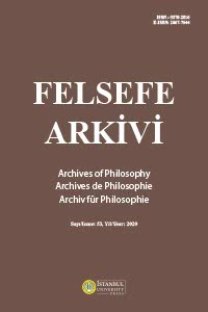Hegel'de Tanrı Bilgisi
Hegel’in, dizgesinde mantık bilimi ve doğa bilimi kısımlarından sonra gelen tin bilimi (tin felsefesi) kısmındaki öznel tin ve nesnel tinden geçerek ulaştığı mutlak tin aşaması, kendini üç aşamada ortaya koymuştur. Bunların ilki sanat ikincisi din ve üçüncüsü felsefedir. Hegel, mutlak tinin gelişiminin ikinci aşaması olan dini de Din Felsefesi Üzerine Dersler’inde din kavramı, sonlu dinler ve mutlak din olarak aşamalandırmıştır. 1827 yılındaki Din Felsefesi Üzerine Dersler’inde din kavramı Hegel tarafından yine üç aşamada değerlendirilir. Bunlar Tanrı kavramı, Tanrı bilgisi ve külttür. Bu çalışmanın odaklandığı kısım din kavramı dahilindeki Tanrı bilgisidir. Dinde Tanrı olarak ortaya çıkan mutlak tin, bu biçimiyle dinin de tek içeriğidir. Hegel için böylesi bir içeriğe ilişkin bilgi de ne salt iman ya da dolaysız bilgi ile ne de rasyonel teolojinin anladığı akılla olanaklıdır. Tanrı’ya yükseliş dolaysız bilmeden başlayan ama orada kalmayan, duygu, tasarım ve düşünme aşamalarına ilerleyen bir yükseliştir. Bu çalışmada Hegel’in Tanrı bilgisi üzerine sunduğu görüşler gösterilmeden önce Tanrı bilgisine ilişkin kendisinden önceki görüşler ve Hegel’in bu görüşlere getirdiği eleştirilere değinilmiştir. Hegel bu görüşlerden özellikle rasyonel teoloji ile Kant’ın Tanrı bilgisi anlayışına ve Jacobi’de öne çıkan dolaysız bilgiye dayalı anlayışa bir yanıt vermek istemektedir. Çalışmada bu görüş ve eleştirilerin ardından Hegel’in kendi dizgesindeki Tanrı bilgisi anlayışı incelenmiştir. Tanrı bilgisi kapsamında dinsel bilincin üç biçimi yani duygu, tasarım, düşünme biçimleri ve bunların Tanrı ile ilişkisi ele alınmıştır. Bu anlamda çalışmanın amacı da Hegel için Tanrı’ya dair bilginin olanaklı olduğunun ve bunun dinsel bilincin üç biçimi olan duygu, tasarım ve düşünme biçimlerinde incelenebileceğinin gösterilmesidir.
Knowledge of God in Hegel
The Absolute Spirit stage, which Hegel reached after passing through the Subjective Spirit and Objective Spirit in the Science of Spirit (Philosophy of Spirit) sections in Hegel’s system, manifested itself in three stages, the first of which is art, the second is religion, and the third is philosophy. Hegel, in his Lectures on the Philosophy of Religion, divided religion, which is the second stage of the development of the Absolute Spirit, into stages such as the concept of religion, finite religions, and absolute religion. In his Lectures on the Philosophy of Religion in 1827, the concept of religion is again evaluated by Hegel in three stages, which are the concept of God, knowledge of God, and cult. The focus of this study is the knowledge of God within the concept of religion. The Absolute Spirit, which appears as God in religion, is also the only content of religion in this form. For Hegel, knowledge of such content is not possible either by pure faith or by reason understood by rational theology. The elevation to God is an elevation that begins without immediate knowing but does not stay there, progressing to the stages of feeling, representation, and thinking. In this study, before the views of Hegel on the knowledge of God are shown, the views of his predecessors on the knowledge of God and Hegel’s criticisms of these views are mentioned. From these views, Hegel especially wants to answer the rational theology and Kant’s understanding of God and Jacobi’s understanding based on immediate knowledge. In the study, after these views and criticisms, Hegel’s understanding of the knowledge of God in his system was examined. Within the scope of God’s knowledge, three types of religious consciousness are discussed: feeling, representation, and thinking, as well as their relationship with God. In this sense, the aim of the study is to show that the knowledge of God is possible for Hegel and that this can only be examined in the three forms of religious consciousness, feeling, representation and thinking.
Keywords:
God, religion, absolute, representation,
___
- Hegel, G. W. F. Anahatlarda Felsefi Bilimler Ansiklopedisi I: Mantık Bilimi, çev. Aziz Yardımlı, İstanbul: İdea Yayınevi, 2014. google scholar
- Hegel, G. W. F. Lectures on the Philosophy of Religion: Volume I, Introduction and The Concept of Religion, çev. R. F. Brown, P. C. Hodgson, J. M. Stewart, ed. P. C. Hodgson, Berkeley: University of California Press, 1984. google scholar
- Hodgson, Peter C. Hegel and Christian Theology: A Reading of the Lectures on the Philosophy of Religion, Oxford: Oxford University Press, 2005. google scholar
- Kant, Immanuel. Critique of Pure Reason, çev. Paul Guyer ve Allen W. Wood, Cambridge: Cambridge University Press, 1998. google scholar
- Kant, Immanuel. “Felsefi Teolojiye Giriş” çev. M. S. Reçber, Felsefe Dunyası. 40, Şubat 2004, 148-164. google scholar
- Kervégan, Jean François. Hegel ve Hegelcilik, çev. İsmail Yerguz, Ankara: Dost, 2011. google scholar
- Kılıç, Recep. Modern Batı Duşuncesinde Vahiy, İstanbul: Ötüken, 2004. google scholar
- Leighton, J. A. “Hegel’s Conception Of God”, The Philosophical Review 5-6, Kasım 1896, 601-618. google scholar
- Neiman, Susan. The Unity of Reason: Rereading Kant, Oxford: Oxford University Press, 1994, 149-150. google scholar
- Pinkard, Terry. Hegel: A Biography, Cambridge: Cambridge University Press, 2000. google scholar
- Stewart, John. An Introduction Hegel’s Lectures on the Philosophy of Religion, Oxford: Oxford University Press, 2022. google scholar
- Vancourt, Raymond. “Hegel’in Din Felsefesi”, Din Felsefesi Yazıları I, çev. Zeki Özcan, İstanbul: Alfa, 2001. google scholar
- ISSN: 0378-2816
- Yayın Aralığı: 2
- Başlangıç: 1945
- Yayıncı: İstanbul Üniversitesi
